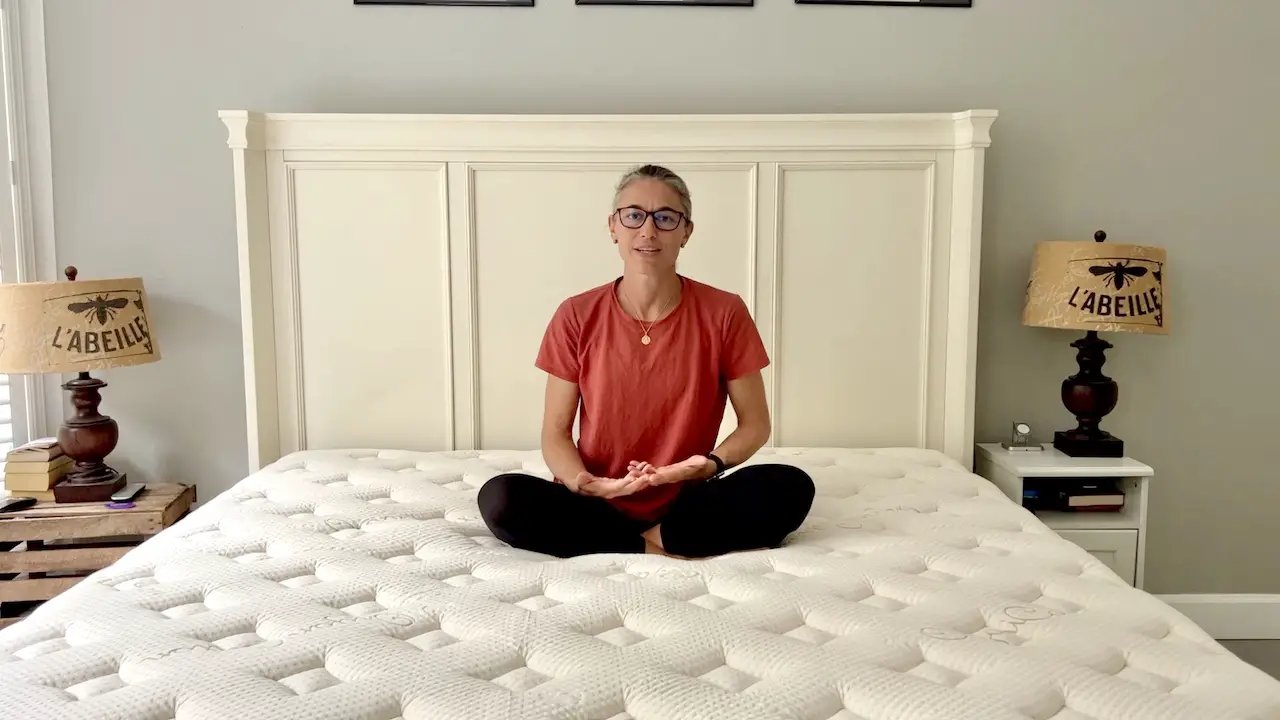BENEFITS OF SLEEP MEDITATION
How It Can Improve Your Rest and Well-being
Sleep is essential to our physical and mental well-being, yet millions of people struggle to get the quality rest they need each night.
Whether due to stress, anxiety, poor sleep habits, or an uncomfortable sleep environment, insomnia and sleep disturbances are increasingly common in today’s fast-paced world. One natural and highly effective remedy gaining widespread attention is sleep meditation.
Let’s take a closer look at the many benefits of sleep meditation, how it works, and how you can incorporate it into your nightly routine for deeper, more restorative rest. Whether you are already using meditation to fall asleep or just curious about how it works, this article will help you understand why so many people are turning to sleep meditation for better sleep.
Table of Contents
What Is Sleep Meditation?
Sleep meditation is a relaxation technique designed to prepare your body and mind for sleep. It typically involves mindfulness, deep breathing, and visualization exercises aimed at calming your nervous system and promoting a sense of peace and presence. Unlike other forms of meditation that are done sitting upright, sleep meditation is usually practiced lying down in bed, often just before falling asleep.
Common formats of sleep meditation include:
Guided meditation audio recordings or apps
Body scan meditations
Breathing exercises
Progressive muscle relaxation
Visualization or “journey” meditations
Mantra or affirmation repetition
Whether led by a voice or done silently, sleep meditation works by redirecting your attention away from racing thoughts, helping your body transition into a parasympathetic (rest and digest) state.
The Science Behind Sleep Meditation
Research shows that sleep meditation can significantly improve sleep quality. When practiced regularly, it helps lower heart rate, reduce blood pressure, and decrease levels of the stress hormone cortisol. These physical changes signal to your body that it is time to rest.
Here’s how sleep meditation affects your brain and body:
Reduces stress and anxiety: Meditation activates the prefrontal cortex and reduces activity in the amygdala, the part of the brain responsible for fear and worry.
Increases melatonin production: Some studies show that mindfulness practices like sleep meditation may boost melatonin, a hormone critical for sleep-wake regulation.
Encourages slower brain waves: Meditation can promote alpha and theta brainwave activity, which are associated with deep relaxation and the onset of sleep.
Improves parasympathetic tone: This shifts the body into a restful state, helping you fall asleep faster and stay asleep longer.
Key Benefits of Sleep Meditation
1. Helps You Fall Asleep Faster
One of the biggest benefits of sleep meditation is how effectively it helps you fall asleep. By guiding your focus away from anxious or busy thoughts, it calms the mental chatter that often delays sleep.
In a 2015 study published in JAMA Internal Medicine, participants who practiced mindfulness-based sleep meditation fell asleep more quickly and reported less insomnia than those who didn’t.
2. Improves Sleep Quality
Even if you can fall asleep easily, sleep meditation can enhance how deeply and restfully you sleep. It reduces nocturnal awakenings and encourages more time in restorative slow-wave and REM sleep stages.
A consistent sleep meditation practice helps regulate sleep cycles, which can be especially beneficial for shift workers or those with irregular sleep patterns.
3. Reduces Nighttime Anxiety
Anxiety is one of the most common barriers to restful sleep. Worrying about tomorrow’s to-do list or replaying stressful events can keep your mind alert when it should be winding down.
Sleep meditation teaches you to notice your thoughts without engaging with them, reducing their emotional power. Over time, this creates a healthier mental relationship with sleep and bedtime.
4. Supports Emotional Health
Sleep and mental health are deeply connected. Poor sleep can worsen anxiety and depression, and mood disorders can disrupt sleep.
By promoting relaxation and mindfulness, sleep meditation acts as a buffer against emotional stressors. A calm nighttime routine anchored in meditation can improve mood, resilience, and overall well-being.
5. Lowers Heart Rate and Blood Pressure
Sleep meditation encourages diaphragmatic breathing and a relaxed state that lowers heart rate and blood pressure—essential for a restful night.
Chronic stress can lead to elevated cortisol and increased heart activity at night, both of which impair sleep. Sleep meditation helps counteract these physiological responses.
6. Non-Habit Forming Alternative to Sleep Aids
Unlike prescription or over-the-counter sleep medications, sleep meditation is a natural, drug-free method to improve sleep without dependency or side effects.
Many people turn to sleep meditation when looking for a long-term solution to insomnia or a gentle alternative to melatonin supplements or sleep aids.
7. Enhances Mind-Body Awareness
Sleep meditation builds greater awareness of how your body feels at night—tight muscles, shallow breathing, or mental stress. This can lead to better lifestyle decisions throughout the day that support healthy sleep, such as reducing caffeine or creating a relaxing bedtime routine.
How to Practice Sleep Meditation at Home
In today’s age, starting a sleep meditation practice is simple and requires no special tools or experience. Here’s how to get started:
Step 1: Prepare Your Sleep Environment
Create a peaceful, comfortable sleep setting:
Dim the lights
Keep your bedroom cool and quiet
Turn off electronic devices or use a blue light filter
Add a white noise machine if needed
Step 2: Choose a Meditation Type
You can find sleep meditation scripts or audio guides online or through popular apps like:
Calm
Headspace
Insight Timer (my personal favorite!)
Aura
BetterSleep
Some people prefer body scans, while others respond well to visualization or nature sounds. Experiment to find what works best.
Step 3: Lie Down and Relax
Once in bed, lie on your back or preferred sleeping position. Close your eyes and take a few deep breaths to center yourself.
Let go of any judgment or effort to fall asleep. The goal of sleep meditation is to rest in the present moment—not to force sleep.
Step 4: Follow the Meditation
Whether it is a recorded voice or your own internal practice, follow the guidance. You might be asked to:
Bring awareness to your breath
Scan your body from head to toe
Visualize a peaceful scene
Repeat a calming word or phrase
It is okay if your mind wanders—gently return your focus when you notice.
Step 5: Drift Off Naturally
Sleep often comes on gradually during or after meditation. You don’t need to “complete” the meditation—many people fall asleep halfway through.
If you are using your phone for meditation guidance, ensure to have set it up to turn to Sleep focus, or Do Not Disturb, shortly after the intended end of your sleep. meditation, to avoid being woken up by alerts and notifications.
Best Times to Use Sleep Meditation
While sleep meditation is most commonly used at bedtime, it can also be beneficial during:
Middle-of-the-night awakenings: Calm your mind and ease back to sleep without frustration.
Naps: Use meditation to relax quickly and make the most of short rest periods.
Evening wind-downs: Create a buffer between your busy day and bedtime to transition into a restful state.
- Times of stress: For easy and rapid access, create playlists with a pre-selection of tracks that you trust for different events in your life that lead to sleep disturbances (i.e., pregnancy, IVF, burnout, testing, etc.)
Sleep Meditation vs. Mindfulness vs. Hypnosis
While related, sleep meditation, mindfulness, and hypnosis serve slightly different purposes:
| Technique | Purpose | Best For |
|---|---|---|
| Sleep Meditation | Prepare the mind/body for sleep | Falling asleep, reducing anxiety |
| Mindfulness | Stay present throughout the day | Reducing stress, awareness |
| Hypnosis | Access subconscious suggestions | Behavioral change, deep sleep |
Some sleep meditation programs blend all three techniques for powerful results.
Who Should Try Sleep Meditation?
Sleep meditation can be helpful for:
People with chronic insomnia
Those with anxiety or racing thoughts
Shift workers or frequent travelers
Children or teens who struggle with bedtime
Anyone looking for a natural way to sleep better
It is safe, accessible, and adaptable to all ages and experience levels. If you struggle with serious sleep disorders or mental health conditions, it is a good idea to speak with a healthcare provider before relying solely on meditation.
Tools to Enhance Your Sleep Meditation Practice
To deepen the effects of sleep meditation, consider:
Weighted blankets: These can promote a sense of calm and grounding.
Cooling mattress protectors: Temperature control supports better rest.
Aromatherapy diffusers: Scents like lavender can enhance relaxation.
High-quality mattresses: A supportive mattress improves physical comfort during meditation and sleep.
Be sure to check out our in-depth mattress and bedding reviews to create a sleep environment that supports your meditation practice. If you have a mattress in mind, search for it in the search box, top right!
Is Sleep Meditation Right for You? - Final Thoughts
Sleep is the foundation of health—and sleep meditation offers a gentle, effective way to improve it. With its roots in mindfulness and relaxation, this practice helps your body and mind align for restful, rejuvenating sleep.
Whether you’re dealing with occasional stress or chronic insomnia, sleep meditation empowers you to take control of your nightly routine in a natural, non-invasive way.
By combining sleep meditation with a comfortable sleep environment—like the right mattress, sheets, and sleep accessories—you can unlock deeper rest and a better quality of life.
References
- JAMA Network. (2015). Mindfulness Meditation and Improvement in Sleep Quality and Daytime Impairment Among Older Adults With Sleep Disturbances. Retrieved from https://jamanetwork.com/journals/jamainternalmedicine/fullarticle/2110998
- HealthyR-U. (2025). Melatonin and Meditation: A Perfect Pair for Deep Relaxation. Retrieved from https://www.healthyr-u.com/blogs/brain-health/melatonin-and-meditation-a-perfect-pair-for-deep-relaxation?srsltid=AfmBOoqih46CnLeJH9hZmF15JVTfw3Mp0FvD5t8yJZlWV425j7tyRyAa
- HealthLine. (2024). 3 Ways to Meditate for Better Sleep. Retrieved from https://www.healthline.com/health/meditation-for-sleep
- Mayo Clinic. (2023). Meditation: A simple, fast way to reduce stress. Retrieved from https://www.mayoclinic.org/tests-procedures/meditation/in-depth/meditation/art-20045858
FAQ
Most frequent questions and answers
Popular choices include Calm, Headspace, and Insight Timer. Each offers free and premium guided meditations specifically for sleep.
Most sleep meditations range from 10 to 45 minutes. Start with a short version and increase the length if it helps you relax.
Yes. Unlike traditional seated meditation, sleep meditation is often practiced lying down to encourage rest and sleep.
Absolutely. In fact, it’s the goal of sleep meditation. If you fall asleep halfway through, that means it’s working.
Yes. Many apps offer child-friendly guided meditations and sleep stories that help kids fall asleep faster and feel more secure at bedtime.
What is the best sleep meditation app?
Popular choices include Calm, Headspace, and Insight Timer. Each offers free and premium guided meditations specifically for sleep.
How long should sleep meditation be?
Most sleep meditations range from 10 to 45 minutes. Start with a short version and increase the length if it helps you relax.
Can you meditate while lying in bed?
Yes. Unlike traditional seated meditation, sleep meditation is often practiced lying down to encourage rest and sleep.
Is it okay if I fall asleep during meditation?
Absolutely. In fact, it’s the goal of sleep meditation. If you fall asleep halfway through, that means it’s working.
Can kids use sleep meditation?
Yes. Many apps offer child-friendly guided meditations and sleep stories that help kids fall asleep faster and feel more secure at bedtime.
Share this deal with a friend!

Laura Georgieff
Laura is a mother of three who did not sleep through the night for the first 5.5 years of her kids' lives. She is passionate about sleep quality and loves sharing her experience and knowledge of all thing bedding! It is her mission to help you make the best decisions when it comes to sleep and help you get the best deal on the market!






